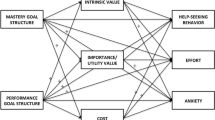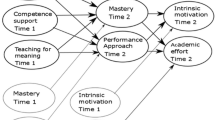Abstract
The purpose of this study was to explore relations between mathematics achievement, self-concept, goal orientation, intrinsic motivation, and help-seeking behavior among adults studying for a high school diploma. Participants in this study were 145 adults (55 males and 90 females) enrolled in nine first year high school classes for adult students at five high schools in three cities in Norway. The age of the students varied from 18 to 52 years. Data were analyzed by means of structural equation modeling. The results indicate that mathematics self-concept in adult years build strongly on achievement in school years and that it is predictive of adult students’ goal orientation, intrinsic motivation, and learning strategies. Three weakly correlated dimensions of goal orientation predicted interest and help-seeking behavior in mathematics lessons differently.
Similar content being viewed by others
References
C. Ames (1990) ArticleTitleMotivation: what teachers need to know Teachers College Record 91 409–421
C. Ames (1992) ArticleTitleClassrooms: goals, structures, and student motivation Journal of Educational Psychology 84 261–271 Occurrence Handle10.1037//0022-0663.84.3.261
C. Ames J. Archer (1988) ArticleTitleAchievement goals in the classroom: students’ learning strategies and motivation processes Journal of Educational Psychology 80 260–267 Occurrence Handle10.1037//0022-0663.80.3.260
R. Ames (1983) Help-seeking and achievement orientation: perspectives from attribution theory B. DePaulo A. Nadler J. Fisher (Eds) New directions in helping Academic Press New York 165–188
A. Arbreton (1998) Students goal orientation and help-seeking strategy use S.A. Karabenick (Eds) Strategic help-seeking. Implications for learning and teaching Lawrence Erlbaum Ass Mahwah, NJ 95–116
K.A. Bollen (1989) ArticleTitleA new incremental fit index for general structural models Sociological Methods & Research 17 303–316
M. Bong E.M. Skaalvik (2003) ArticleTitleAcademic self-concept and self-efficacy: how different are they really? Educational Psychology Review 15 1–40 Occurrence Handle10.1023/A:1021302408382
B.M. Byrne (2001) Structural equation modeling with AMOS: basic concepts, applications, and programming Lawrence Erlbaum Ass Mahwah, N.J
B.M. Byrne G.D.A. Worth (1996) ArticleTitleThe Shavelson model revisited: testing for the structure of academic self-concept across pre-, early, and late adolescents Journal of Educational Psychology 88 215–228 Occurrence Handle10.1037//0022-0663.88.2.215
M.V. Covington (1984) ArticleTitleThe self-worth theory of achievement motivation: findings and implications The Elementary School Journal 85 5–20 Occurrence Handle10.1086/461388
M.V. Covington (1992) Making the grade: a self-worth perspective on motivation and school reform Cambridge University Press Cambridge
J.L. Duda J.G. Nicholls (1992) ArticleTitleDimensions of achievement motivation in schoolwork and sport Journal of Educational Psychology 84 290–299 Occurrence Handle10.1037//0022-0663.84.3.290
J. Eccles A. Wigfield R.D. Harold P. Blumenfeld (1993) ArticleTitleAge and gender differences in children’s self- and task perceptions during elementary school Child Development 64 830–847 Occurrence Handle8339698
A.J. Elliot M.A. Church (1997) ArticleTitleA hierarchical model of approach and avoidance achievement motivation Journal of Personality and Social Psychology 72 218–232 Occurrence Handle10.1037//0022-3514.72.1.218
E.S. Elliott C.S. Dweck (1988) ArticleTitleGoals: An approach to motivation and achievement Journal of Personality and Social Psychology 54 5–12 Occurrence Handle10.1037//0022-3514.54.1.5 Occurrence Handle3346808
J.D. Fisher A. Nadler S. Whitcher_Alagna (1982) ArticleTitleRecipient reactions to aid Psychological Bulletin 91 27–54 Occurrence Handle10.1037//0033-2909.91.1.27
J.M. Harackiewicz K.E. Barron S.M. Carter A.T. Lehto A.J. Elliot (1997) ArticleTitlePredictors and consequences of achievement goals in the college classroom; maintaining interest and making the grade Journal of Personality and Social Psychology 73 1284–1295 Occurrence Handle10.1037//0022-3514.73.6.1284
J.M. Harackiewicz K.E. Barron A.J. Elliot (1998) ArticleTitleRethinking achievement goals: when are they adaptive for college students and why? Educational Psychologist 33 1–21
J.M. Harackiewicz K.E. Barron P.R. Pintrich A.J. Elliot T.M. Thrash (2002) ArticleTitleRevision of achievement goal theory: Necessary and illuminating Journal of Educational Psychology 94 638–645 Occurrence Handle10.1037//0022-0663.94.3.638
S. Harter (1982) ArticleTitleThe perceived competence scale for children Child Development 53 87–97
L.T. Hu P.M. Bentler (1999) ArticleTitleCutoff criteria for fit indexes in covariance structure analysis: conventional criteria versus new alternatives Structural Equation Modeling: a Multidisciplinary Journal 6 1–55
C.M. Jagacinski J.G. Nicholls (1987) ArticleTitleCompetence and affect in task involvement and ego involvement: The impact of social comparison information Journal of Educational Psychology 79 107–114 Occurrence Handle10.1037//0022-0663.79.2.107
H.B. Kaplan (1980) Deviant behavior in defence of self Academic Press New York
S.A. Karabenick J.R. Knapp (1991) ArticleTitleRelationships of academic help-seeking to the use of learning strategies and other instrumental achievement behavior in college students Journal of Educational Psychology 83 221–230 Occurrence Handle10.1037//0022-0663.83.2.221
S.A. Karabenick R. Sharma (1994) ArticleTitlePerceived teacher support of student questioning in the college classroom – its relation to student characteristics and role in the classroom questioning process Journal of Educational Psychology 86 90–103 Occurrence Handle10.1037//0022-0663.86.1.90
T. Manger O.J. Eikeland (1997) ArticleTitleThe effects of mathematical achievement and cognitive ability on girls’ and boys’ mathematical self-concept Zeitschrift für Pädagogische Psychologie 12 IssueID4 209–218
H.W. Marsh (1990) ArticleTitleA multidimensional, hierarchical self-concept: theoretical and empirical justification Educational Psychology Review 2 77–172 Occurrence Handle10.1007/BF01322177
H.W. Marsh B.M. Byrne R.J. Shavelson (1988) ArticleTitleA multifaceted academic self-concept: Its hierarchical structure and its relation to academic achievement Journal of Educational Psychology 80 366–380 Occurrence Handle10.1037//0022-0663.80.3.366
Marsh, H.W. & Craven, R.G. (2000). Swimming in the school: expanding the scope of the Big Fish Little Pond Effect. Paper presented at the 2000 Self Research Centre Conference in Sydney, Australia.
H.W. Marsh A.S. Yeung (1997) ArticleTitleCoursework selection: Relations to academic self-concept and achievement American Educational Research Journal 34 691–720
M.J. Middleton C. Midgley (1997) ArticleTitleAvoiding the demonstration of lack of ability: an under-explored aspect of goal theory Journal of Educational Psychology 89 710–718 Occurrence Handle10.1037//0022-0663.89.4.710
C. Midgley A. Kaplan M.J. Middleton (2001) ArticleTitlePerformance-approach goals: good for what, for whom, under what circumstances, and at what cost? Journal of Educational Psychology 93 77–86
D.T. Miller M. Ross (1975) ArticleTitleSelf-serving biases in the attribution of causality: fact or fiction? Psychological Bulletin 82 213–225
S. Nelson-Le Gall L. Resnick (1998) Help-seeking, achievement motivation and the social practice of intelligence in school S.A. Karabenick (Eds) Strategic help-seeking. Implications for learning and teaching Lawrence Erlbaum Ass Mahwah, NJ 39–60
R.S. Newman (1990) ArticleTitleChildren’s help-seeking in the classroom: The role of motivational factors and attitudes Journal of Educational Psychology 82 71–80 Occurrence Handle10.1037//0022-0663.82.1.71
R.S. Newman (1991) Goals and self-regulated learning: what motivates children to seek academic help? M.L. Maehr P.R. Pintrich (Eds) Advances in motivation and achievement, Vol. 7. JAI Press Greenwich, CN 151–183
R.S. Newman (1994) Adaptive help-seeking: a strategy of self-regulated learning D.H. Schunk B.J. Zimmerman (Eds) Self-regulation of learning and performance: issues and educational applications Erlbaum Mahwah, NJ 283–301
R.S. Newman (1998) Adaptive help-seeking: a role of social interaction in self-regulated learning S.A. Karabenick (Eds) Strategic help-seeking. Implications for learning and teaching Lawrence Erlbaum Ass Mahwah NJ 13–37
R.S. Newman (2000) ArticleTitleSocial influences on the development of children’s adaptive help-seeking: the role of parents, teachers, and peers Developmental Review 20 350–404 Occurrence Handle10.1006/drev.1999.0502
R.S. Newman L. Goldin (1990) ArticleTitleChildren’s reluctance to seek help with schoolwork Journal of Educational Psychology 82 92–100 Occurrence Handle10.1037//0022-0663.82.1.92
J.G. Nicholls (1983) Conceptions of ability and achievement motivation: a theory and its implications for education S.G. Paris G.M. Olson H.W. Stevenson (Eds) Learning and motivation in the classroom Lawrence Erlbaum Ass. Hillsdale, New Jersey 211–237
J.G. Nicholls (1989) The competitive ethos and democratic education Harvard University Press Cambridge, MA
S. Nolen (1988) ArticleTitleReasons for studying: Motivational orientations and study strategies Cognition and Instruction 5 269–287
P.R. Pintrich (2000) ArticleTitleMultiple goals, multiple pathways: The role of goal orientation in learning and achievement Journal of Educational Psychology 92 544–555 Occurrence Handle10.1037//0022-0663.92.3.544
S.G. Rayner U. Devi (2001) Self-esteem and self-perceptions in the classroom: valuing circle time? R.J. Riding S.G. Rayner (Eds) International perspectives on individual differences, Volume 2: Self perception Ablex Publishing Westport Connecticut 171–208
M. Rosenberg (1979) Conceiving the self Basic Books New York
A.M. Ryan M.H. Gheen C. Midgley (1998) ArticleTitleWhy do some students avoid asking for help? An examination of the interplay among students’ academic efficacy, teachers’ social-emonional role, and classroom goal structure Journal of Educational Psychology 90 528–535 Occurrence Handle10.1037//0022-0663.90.3.528
A.M. Ryan L. Hicks C. Midgley (1997) ArticleTitleSocial goals, academic goals, and avoiding help in the classroom Journal of Early Adolescence 17 152–171
A.M. Ryan P.R. Pintrich (1997) ArticleTitleShould I ask for help? The role of motivation and attitudes in adolescents help-seeking in math class Journal of Educational Psychology 89 329–341 Occurrence Handle10.1037//0022-0663.89.2.329
E. Searcy N. Eisenberg (1992) ArticleTitleDefensiveness in response to aid from a sibling Journal of Personality and Social Psychology 62 422–433 Occurrence Handle10.1037//0022-3514.62.3.422 Occurrence Handle1560336
T.L. Seifert (1995) ArticleTitleCharacteristics of ego- and task-oriented students: a comparison of two methodologies British Journal of Educational Psychology 65 125–138 Occurrence Handle7727263
E.M. Skaalvik (1997a) Issues in resea0rch on self-concept M.L. Maehr P.R. Pintrich (Eds) Advances in motivation and achievement, Vol. 10. JAI Press Greenwich, CN 51–98
E.M. Skaalvik (1997) ArticleTitleSelf-enhancing and self-defeating ego orientation: relations with task and avoidance orientation, achievement, self-perceptions, and anxiety Journal of Educational Psychology 89 71–81 Occurrence Handle10.1037//0022-0663.89.1.71
E.M. Skaalvik (2002) ArticleTitleSelf-enhancing and self-defeating ego goals in mathematics lessons: relationships among task and avoidance goals, achievement, self-perceptions, anxiety, and motivation International Journal of Educology 16 54–76
E.M. Skaalvik R.J. Rankin (1994) ArticleTitleGender differences in mathematics and verbal achievement, self-perception and motivation British Journal of Educational Psychology 64 419–428
E.M. Skaalvik R.J. Rankin (1995) ArticleTitleA test of the Internal/External Frame of Reference Model at different levels of math and verbal self-perception American Educational Research Journal 32 161–184
E.M. Skaalvik S. Skaalvik (2002) ArticleTitleInternal and external frames of reference for academic self-concept Educational Psychologist 37 233–244 Occurrence Handle10.1207/S15326985EP3704_3
E.A. Skinner J. Wellborn J. Connell (1990) ArticleTitleWhat it takes to do well in school and whether I’ve got it: a process model of perceived control and children’s engagement and achievement in school Journal of Educational Psychology 82 22–32 Occurrence Handle10.1037//0022-0663.82.1.22
D. Tice (1993) The social motivations of people with low self-esteem R.F. Baumeister (Eds) Self-esteem. The puzzle of low self-regard Plenum Press New York 37–53
A. Wigfield M. Karpathian (1991) ArticleTitleWho am I and what can I do? Children’s self-concepts and motivation in academic situations Educational Psychologist 26 233–262
Author information
Authors and Affiliations
Corresponding author
Rights and permissions
About this article
Cite this article
Skaalvik, S., Skaalvik, E.M. Self-Concept, Motivational Orientation, and Help-Seeking Behavior in Mathematics: A Study of Adults Returning to High School. Soc Psychol Educ 8, 285–302 (2005). https://doi.org/10.1007/s11218-005-3276-3
Received:
Accepted:
Issue Date:
DOI: https://doi.org/10.1007/s11218-005-3276-3




